Advertisement
'You People Have Double-Crossed Us': Bud Selig's Run-In With Al Gore
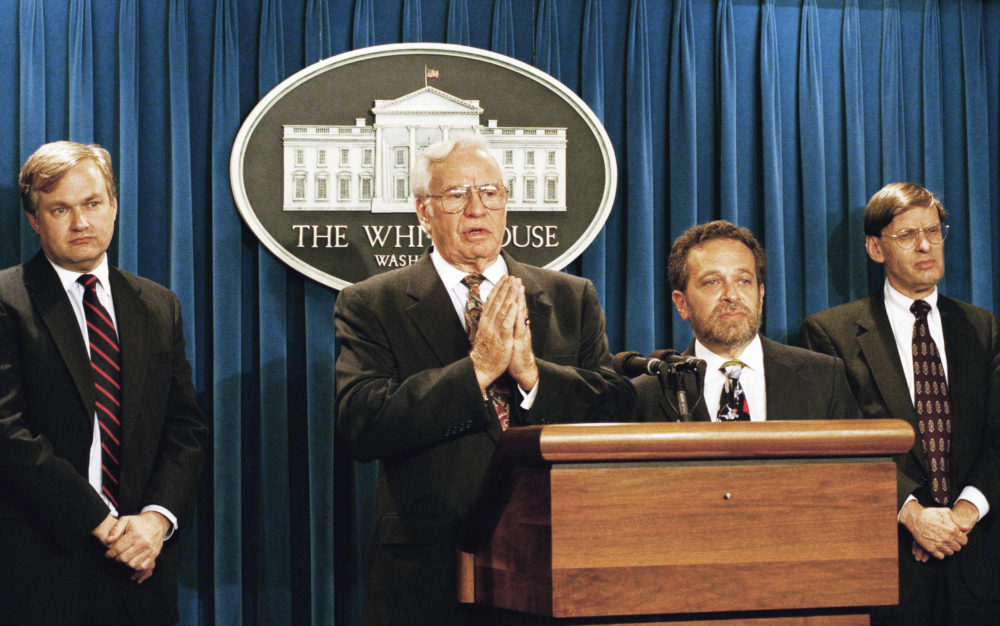
On Aug. 12, 1994, Major League Baseball players walked off the job after months of failed labor negotiations.
A month later, acting Commissioner Bud Selig cancelled the remaining regular season and the entire postseason. That’s when the President of the United States stepped in and helped. Or tried to.
In the fall of 1994, angst filled the void created by the loss of baseball.
Fans of the game were still struggling with the idea that that there’d be no World Series for the first time in 90 years.
"It was shocking," says Bud Selig. "It was just horrendous. That was a really, really dismal time in baseball. People were angry. They were angry with everybody. Including the Commissioner, I may add.
"I got a call from the White House to meet with President Clinton."
There was a history of U.S. presidents getting involved in sports — Teddy Roosevelt called for rule changes to make football safer; FDR told Commissioner Kenesaw Mountain Landis that MLB should carry on during World War II.
'I'm Going To Appoint A Mediator'
Selig hopped on a plane in Milwaukee and arrived in D.C. for the meeting on Oct. 14.
"President Clinton said to me, 'You know, this is unfortunate, and we find ourselves in a tough position. And I'd really like to help in solving it. So I'm going to appoint a mediator, if you agree, by the name of Bill Usery,' " Selig says.
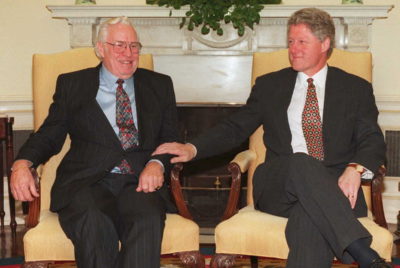
Usery was a former secretary of labor who’d been appointed to arbitrate labor disputes by every U.S. president from Harry Truman to Gerald Ford. The 70-year-old Usery was also trusted by Clinton, and by Major League Baseball Players Association head Donald Fehr. Everyone agreed that Usery was the man for the job. But Clinton had a stipulation for both parties.
"And this is the crucial thing: that whatever Usery came up with, we would accept," Selig says.
The sides negotiated into January of 1995, but made little progress. Then the White House set a deadline of February 6 for a settlement. But Usery still couldn’t bring the sides close to an agreement.
"They were tough — very, very tough — meetings. Bill Usery and I hollered at each other a lot — as much as I liked him, by the way," Selig says. "You know, these were difficult issues."
The sides quibbled over the salary cap, free agency, how much payroll tax teams should pay and how to distribute that revenue to the league’s smaller clubs.
Advertisement
"We didn't agree on a lot of things," Selig says. "But there was a dialogue."
Back To The White House
On Feb. 7, after the deadline for a new agreement had expired, and as the time for spring training approached, Selig went back to Washington to meet with Bill Usery.
"And he gave me his plan and, you know, to be very candid with you, I liked it," Selig says. "But there were a lot of parts of it I didn't like."
Selig knew the owners wouldn’t be happy about Usery’s recommendation of a 50% luxury tax on payrolls above $40 million per season. But …
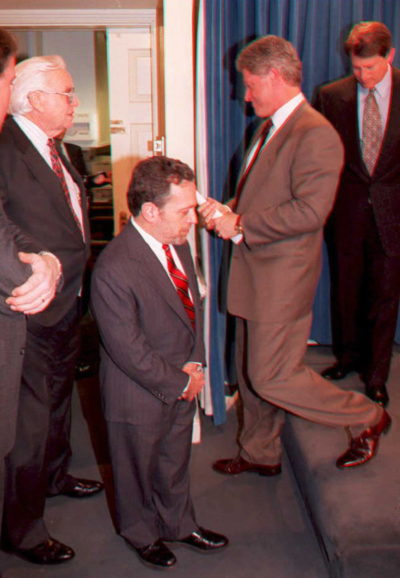
"I said, 'Well, I gave my word on Oct. 14 to the President that I'd accept what you came up with, so I don't have a choice,' " Selig says. "And he said he was going to see the union. And they'd be back to us. That's when the tough part began."
Selig went back to his hotel to brief the owners. Then he waited.
"And now it's 10:00 o’clock, 11:00 o'clock, 12:00 o’clock, 1:00 o'clock, 2:00 o'clock. We started calling everybody that we knew: Sens. Joe Lieberman, Chris Dodd, Herb Kohl, but nobody knew anything," Selig says. "Finally, at 5:00 o'clock, we get a call to meet at the White House."
Selig figured the union had also agreed on Usery’s terms, and that there’d be a new labor deal just in time for a full 1995 MLB season. Selig walked into the Roosevelt Room for a private meeting.
"And there is Don Fehr with a bunch of players," Selig says. "And I can see, by the look on Bill Usery’s face, there's trouble.
"The meeting starts. President Clinton says a few words. And everybody's there — Robert Reich, the labor secretary, George Stephanopoulos and Vice President Gore. Al Gore kind of took over. And Al Gore says 'This deal will not work. Union won't accept it.' And I'm stunned."
Selig says he glanced at Bill Clinton. He had expected the president to hold the union to its word that it would accept Usery’s recommendations. Clinton quickly looked away and then ducked out of the Roosevelt Room. After a desperate, last-minute attempt to hammer out an agreement, the meeting ended abruptly.
F-Bombs
Later, Selig ran into Usery in a hallway.
"And Bill Usery said, 'Harry S. Truman never did this to me. Dwight David Eisenhower never did this to me. John F. Kennedy didn’t, and even Richard Nixon didn't do this to me,' " Selig says. "And I could see he was really upset."
As they talked, Selig was summoned to the Oval Office to meet privately with Bill Clinton.
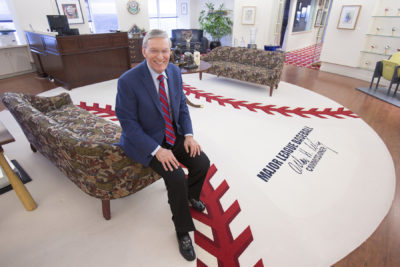
"I said to him, 'Mr. President, you know, I gave my word, as you did, that whatever Bill Usery came up with, we’d accept.' And then, all of a sudden, the door opened. Maybe conveniently. In comes all the same cast of characters. At which point the president kind of disappeared," Selig says. "Vice President Gore took over."
Selig believed Gore was putting his pro-labor constituency above his pledge to help resolve MLB’s impasse.
"I sat there maybe in shock," Selig says. "I finally blew up, and my language was tough."
Selig says F-bombs were involved.
"I said to him, 'You people have double-crossed us. And now we're going to start all over again.' And that was the end of that session. It was a deeply disappointing session."
Resolution
In March of 1995, U.S. District Judge Sonia Sotomayor — now a Supreme Court Justice — issued an injunction that restored the terms of the previous agreement and ordered the sides to keep negotiating. The players returned to the field for a slightly abbreviated 1995 season. The league and the union finally agreed to a new deal in March of 1997. Major League Baseball began the work of winning back its fans.
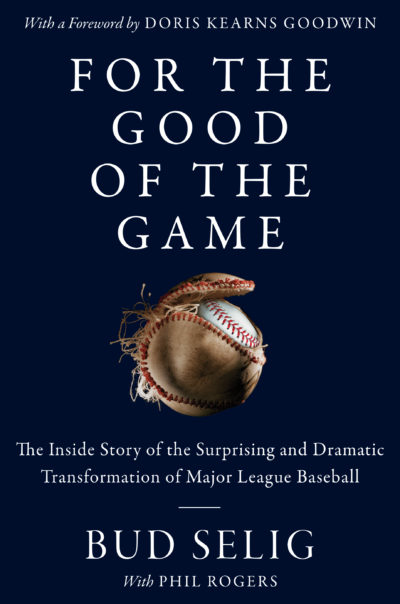
"They were angry at the players, which you didn't want," Selig says. "Angry at the owners. Everybody was angry at the commissioner. But what did it lead to? It was only when we went to labor peace that we started setting attendance records and everything else."
Selig likes to claim that the league has enjoyed labor peace since those negotiations. And that’s true, if you don’t count the near-strike in 2002 after the league insisted that players submit to random testing for performance-enhancing drugs. That was in response to that epic — and slightly fraudulent — home run race featuring Sammy Sosa and Mark McGwire. Which, when you really think about it, was the main reason the fans came back.
So maybe not everything Bud Selig says is exactly true. But I hope he was on the level when he told me about all of those F-bombs bouncing off the walls of the White House.
Bud Selig’s new book is “For the Good of the Game.”
This segment aired on August 17, 2019.

